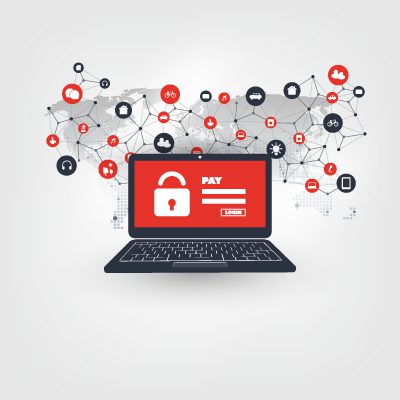
As per the US treasury department, these victim organizations could end up paying hefty fines. That’s why we at MyTek have always stood firm in our recommendation not to pay a ransom demand to whoever is responsible for locking down your systems.
Ransomware Costs Explained
In today’s fast and digital world, cybercriminals can work from any corner and target any individual. Like the old-age bank robbery, they need not be present to commit a crime at the scene. Sitting in Portugal, a cybercriminal can defraud the Federal Credit Union of Poughkeepsie.
One example of defrauding is the use of ransomware tactics. Here, a cybercriminal encrypts your device with malware and makes it dysfunctional. Then, they demand a ransom to make it operational again. However, whether the criminal will stick to their words is something we can’t predict.
We always suggest you to not pay heed to the ransom demands of any hackers. However, you may view it as the best and most cost-effective way to get out of this tricky situation. This sentiment is what most cybercriminals are counting on.
Hence, it’s a bad practice to pay a ransom and wish to get access back to your crucial network devices. Also, there is no guarantee that you will get back the access. The money you pay the hacker can be misused for carrying out another ransom attack. The loop can go on forever.
How Uncle Sam Demands Ransom and Dissuades Businesses with Numerous Strategies
The Treasury Department is seriously cracking down on ransom demands. It is enforcing the Treasury Department’s advice in a revamped manner. In addition to discouraging organizations from paying the ransom fines, the Federal Government can fine businesses for paying ransoms, thereby violating the terms given by the Treasury Office of Foreign Assets Control.
Using the Advisory on Potential Sanctions Risks for Facilitating Ransomware Payments, OFAC gives an idea of the cybercriminal groups like the North Korean Lazarus Group, individuals associated with the SamSam and Cryptolocker, and the Russian cybercriminal syndicate Evil Corp, that operates out of regions with economic sanctions, or with tough sanctions slapped against them. According to these sanctions, it’s illegal and a crime to make financial transactions with these blacklisted groups, including those of ransomware payments.
There is no guarantee that once the ransom is paid, the money will end up in the hands of organizations that pose a direct security threat to your nation.
Unless you get a special license from the Treasury, organizations that facilitate ransomware could incur losses due to ransom demands. Still, they will also end up paying fines in millions of dollars.
Hence, the advisory does not explicitly ban ransomware payments. Instead, businesses are encouraged to follow a stringent path before accepting ransomware demands. They need to contact the respective law enforcement agency and get the necessary clearance or an OFAC license to pay the ransomware.
One cannot predict how the policies will perform, but it is better to follow the laws and be safe from hackers.
What is the Impact of Ransomware on the Insurance Industry?
Many insurance companies advise their customers to pay the ransom. According to them, paying the ransom is cost-effective compared to backup recovery or going through a downtime. These issues are only complicating the ransomware problem.
Government sanctions make it difficult for insurance organizations to cover policy costs. Also, these businesses may not be ready to violate laws and regulations.
Hence, cyber insurance policies will most likely exclude ransomware coverage. It can put businesses in a dilemma of whether to invest in insurance costs.
However, companies need to be more aware of ransomware issues to protect themselves from more significant risks. It is more important as more and more people continue to work remotely.
Also, ransomware attacks occur through phishing messages, such as attachments or suspicious download links. So make sure that your employees know the dangers and are better trained to handle a phishing email.
For more inputs on protecting your company from ransomware, you need a managed service provider like MyTek. We have a mission to help your organization manage its IT policies and make them productive and secure.
Feel free to get in touch by contacting us at 623-312-2440.